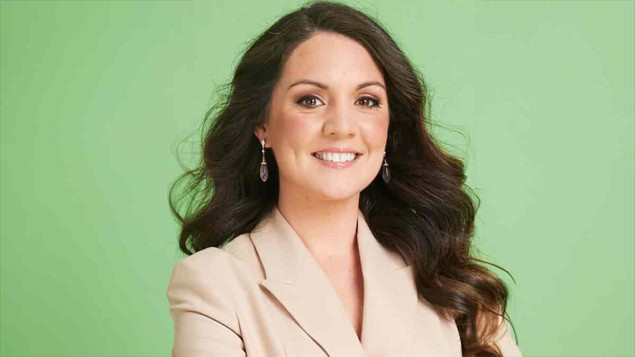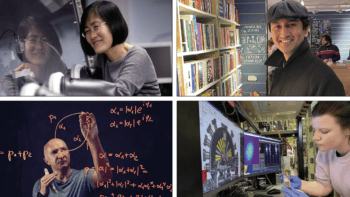Laura Tobin, the broadcast meteorologist for Good Morning Britain, talks to Katherine Skipper about her love of physics, why she’s always over-prepared, and her mission to report on the climate crisis

At the start of her career, Laura Tobin was adamant that she would never be a weather presenter. A trained meteorologist, she was sick of being asked “Are you going to be on TV?” as a joke, aware that it was a comment on her gender as much as her job. “They’re suggesting that you’re going to stand there, point at a screen, and not be credible,” she says.
Today, however, Tobin is a regular fixture on television screens across the UK. Since 2012, she has been a meteorologist and weather presenter for the broadcaster ITV. She says she is grateful she took a chance in her career: “You should never say never. It’s good to give something a go.”
Prepared for anything
Tobin’s career began with a degree in physics and meteorology at the University of Reading, which she completed in 2003. She actually failed the first year of her physics A level (the physics qualification she needed to go to university), but something “clicked” in her second year; she fell in love with the subject and did well in her final exams. “It’s integral to know physics to be able to forecast the weather,” says Tobin. “You need to be able to model the atmosphere and understand how it moves. The atmosphere is essentially a fluid so large parts of my degree were fluid dynamics.“
After graduating she joined the MET Office – the UK’s national meteorological service – as a forecaster. Based in Cardiff, Wales, her work was used to produce local weather services including radio bulletins and forecasts for renewable energy generation, road gritting and hill walking conditions.
This meant that long before she worked in front of a camera, Tobin had to present her work in a way that anyone could understand, which she says was a challenge at first. “When you’re taught scientifically about the weather you have to change the way you speak,” she says.
In her next role, Tobin had to adapt her forecasts to a very different audience. She worked at the Brize Norton Royal Air Force base in Oxfordshire, UK, where she briefed pilots on the weather conditions and delivered reports for the British Forces Broadcasting Service. However, it took her a while to be accepted into the team: “They used to ask me really ridiculous questions. They used to try and catch me out because they wanted to see if I knew what I was talking about because I was a girl and I was young”.
Luckily, Tobin did know what she was talking about. In fact, she has taken a positive lesson from the experience and says she still always over-prepares for any questions that might come her way.
Never say never
When she had been at Brize Norton for five years, Tobin heard that the BBC, a UK public service broadcaster, was recruiting television weather presenters. Despite her earlier misgivings, she decided to give it a go.
When she saw firsthand what the job entailed, she was shocked, “I realized that I had a misconception of what a TV weather presenter was,” she says. The television meteorologists were skilled broadcasters who could deliver regular weather reports in multiple genres, but they also had to understand the science behind everything they said, and they had to be ready to comment on everything from hurricanes to NASA launches.
Tobin took the role and stayed at the BBC for four years before moving to ITV, where she now works on the breakfast programme Good Morning Britain. She has never looked back, but the transition to broadcasting wasn’t seamless. When she started at the BBC, her forecasts were prerecorded and she would often have to do many takes to get them right. She had scientific knowledge but effectively presenting what she knew on live television was a skill she had to learn on the job.
Every weekday morning, Tobin has just a few minutes to give viewers all the information they need about the day’s forecast. This can be a challenge, but she says it’s the most effective way to communicate, “I think if I spoke for longer than a minute on a climate report, I would lose people. You need to be succinct.”
A new mission
In Tobin’s early days as a television meteorologist she would occasionally report on an extreme weather event like record rainfall or temperature. These events have grown more and more frequent and now, as she points out, “they’re happening so often that you can’t report them all”. Today, viewers don’t just watch Tobin to decide whether to pack sunscreen or an umbrella, they look to her for credible information about the climate crisis.
In September 2021, Tobin travelled to Svalbard in the North Pole to report on the effects of climate change for ITV. In one video she stands on what was once the edge of a glacier and explains that in the last 40 years the ice has retreated by half a kilometre. Confronted firsthand with the effects of global warming, Tobin is visibly emotional as she delivers one report to viewers.
But Tobin isn’t all “doom and gloom” – she is passionate about raising awareness of the climate crisis because she believes the people who watch her on television can make a difference. Despite facing a backlash from climate change deniers, she is not deterred, and raising awareness of climate change is now Tobin’s mission: “I’d like to hope that I’m inspiring people to make a change.”



